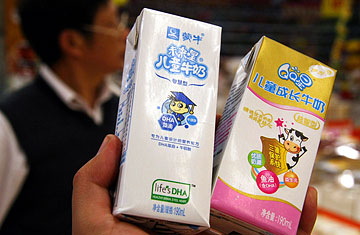
A customer shops for Mengniu Future Star, left, and Yili QQ Star children's milk at a supermarket in Jiangsu province in October 2010
The allegations were bizarre — that tainted milk products had caused a handful of infant girls in China to show signs of premature development. But given China's recent history of food scandals, including the death of six children and the poisoning of some 300,000 more from tainted infant formula in 2008, it didn't seem implausible, either. Despite denials by the accused companies and a government investigation that turned up no problems, Chinese consumers were ready to believe the worst. The suspected companies — first Synutra and later industry giant Yili — saw their sales of infant formula plummet.
This week, the story took another strange twist when Yili announced the allegations were the work of its biggest rival, Mengniu, which sought to harm its competitors by planting false rumors about the safety of their products. According to Yili and Chinese press reports, a Mengniu executive and three employees of BossePR, a Beijing-based public relations firm, have been detained by police in Hohhot, the Inner Mongolian capital where Mengniu and Yili are based. The suspects "used Internet media to maliciously harm the Yili Group's prestige and the reputation of its products," Yili said in a statement.
Mengniu, which was founded by a former Yili employee in 1999, has tried to distance its top management from the scandal. In a statement issued October 21 the company said that no board members or top executives have been detained, and there was "no planning, organization or implementation of any activities to suggest that competitors' products caused premature development." The company acknowledged that one staffer was currently "cooperating with the relevant authorities investigation," but stressed the employee wasn't a high-level executive. According to state media reports, the summer campaign against the dairy producers cost the alleged smear artists about $42,000 to hire people to write defamatory comments on blogs and online forums.
It isn't any of the companies first brush with scandal; Mengniu, Yili and Synutra were among 22 Chinese dairy producers that recalled tainted products in 2008. Dairy farmers were accused of adding melamine, an industrial compound used in making plastics, to milk to make it appear as if it had richer concentrations of protein. Melamine can cause kidney problems when consumed in high levels, and it led to the death of six children throughout China that year. The level of melamine in Mengniu, Yili and Synutra products was quite small, however, compared with products from the now-defunct Sanlu, the dairy producer at the center of the scandal.
China's dairy giants have been trying to restore the reputation of their products ever since. When the allegations of tainted materials causing premature development surfaced last summer, widespread distrust of the industry surfaced again. China's Ministry of Health tested the suspect infant formula and cleared the products' safety in mid-August, but the damage had already been done. Shares of Nasdaq-listed Synutra dropped by a third over the first weeks of August.
The unfolding accusations of a smear campaign will undoubtedly focus attention on shady methods in Chinese public relations, in which paying off reporters is a common practice. But the ease with which the allegations spread shows that despite two years of efforts to clean up the dairy industry, consumers are prepared to believe the worst about food safety in China.
